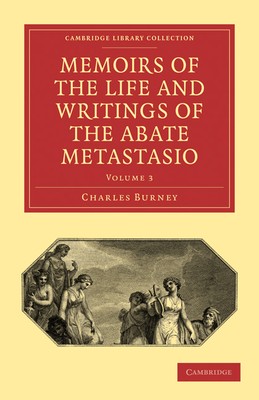
- We will send in 10–14 business days.
- Author: Charles Burney
- Publisher: Cambridge University Press
- ISBN-10: 1108014666
- ISBN-13: 9781108014663
- Format: 14 x 21.6 x 2.5 cm, minkšti viršeliai
- Language: English
- SAVE -10% with code: EXTRA
Memoirs of the Life and Writings of the Abate Metastasio (e-book) (used book) | bookbook.eu
Reviews
Description
This three-volume biography, first published in 1796, recounts the colourful life of the popular Italian poet and librettist Pietro Trapassi (1698-1782), better known by his pseudonym Metastasio. Charles Burney (1726-1814), a British composer and the author of a celebrated four-volume History of Music published between 1776 and 1789, interweaves his own accounts of the poet's life with Metastasio's original letters translated into English. Metastasio's posthumously published correspondence with his friends and patrons provides the essential thread to understanding his complex life and affairs. The son of a shopkeeper, Metastasio was adopted as a young boy by the director of the Arcadian Academy, Giovanni Vincenzo Gravina, who was charmed by the child's extraordinary talent for improvising poetry. Volume 3 covers Metastasio's life and correspondence from 1770 until his death. It includes notes on Metastasio's style as well as separate chronologies of his secular dramas and oratorios.
EXTRA 10 % discount with code: EXTRA
The promotion ends in 22d.10:25:40
The discount code is valid when purchasing from 10 €. Discounts do not stack.
- Author: Charles Burney
- Publisher: Cambridge University Press
- ISBN-10: 1108014666
- ISBN-13: 9781108014663
- Format: 14 x 21.6 x 2.5 cm, minkšti viršeliai
- Language: English English
This three-volume biography, first published in 1796, recounts the colourful life of the popular Italian poet and librettist Pietro Trapassi (1698-1782), better known by his pseudonym Metastasio. Charles Burney (1726-1814), a British composer and the author of a celebrated four-volume History of Music published between 1776 and 1789, interweaves his own accounts of the poet's life with Metastasio's original letters translated into English. Metastasio's posthumously published correspondence with his friends and patrons provides the essential thread to understanding his complex life and affairs. The son of a shopkeeper, Metastasio was adopted as a young boy by the director of the Arcadian Academy, Giovanni Vincenzo Gravina, who was charmed by the child's extraordinary talent for improvising poetry. Volume 3 covers Metastasio's life and correspondence from 1770 until his death. It includes notes on Metastasio's style as well as separate chronologies of his secular dramas and oratorios.


Reviews